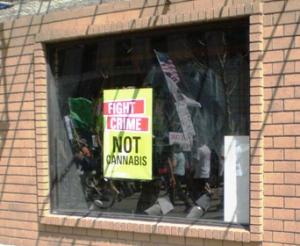In one of the largest medical marijuana demonstrations in years, as many as a thousand people came out in Oakland Monday to let President Obama know he needs to end the federal crackdown on dispensaries.
There was some interesting and well-informed discussion at Oaksterdam University Saturday night as the authors of four recent books on marijuana sat down to talk and think out loud.
Washington state's I-502 marijuana legalization initiative did well in polling this week and even better in fundraising. This thing could win, and it has the money to help make that happen.
A proposed constitutional amendment to legalize marijuana in Montana has failed to gather enough signatures to qualify for the ballot, but voters in Big Sky County will still have the chance to vote on medical marijuana.
Harborside fights for its life, LA bans dispensaries, and Oregon transplant hospitals are lightening up on medical marijuana patients. Those are the big stories this week, but there's plenty more, too.
The English speaking Central American nation of Belize has undertaken a review of whether to decriminalize the possession of small amounts of marijuana.
It's almost time for the hash harvest in Lebanon, and farmers are taking up arms to protect their cash crop from eradicators.
One man is dead after swallowing drugs and being hit with a stun gun in Indianapolis as he tried to flee an arrest. Another is dead in Massachusetts after he was shot trying to flee an arrest in his car.
Bad cop, no donut for a Miami sergeant, two more TSA screeners cop pleas in LA, and a Phoenix cop couldn't keep his paws off the evidence room goodies.
Several hundred -- perhaps as many as a thousand -- medical marijuana patients, providers, and supporters took to the streets of Oakland Monday afternoon to put President Obama on notice that they are extremely unhappy with his administration's crackdown on dispensaries. The president arrived at the Fox Theater in downtown Oakland for a fundraising event later Monday evening.

signs in business reflect community support (all photos by Drug War Chronicle)
The crowd was up in arms over the federal offensive that has seen hundreds of California dispensaries shuttered by threats of asset forfeiture or criminal prosecution since the state's four US Attorneys announced the joint offensive last fall. But it was even more incensed by the May raids on Richard Lee's
Oaksterdam University and last week's issuance of asset forfeiture lawsuits aimed
Harborside Health Center, the nation's largest medical marijuana dispensary.
Steve
DeAngelo,
Harborside's chief executive officer, led the raucous march past
Oaksterdam University as it circled the Fox Theater before returning to Frank Ogawa Plaza. Waving signs saying "Fight Crime, Not Cannabis" and "Save
Harborside, Save My Job," demonstrators chanted "Obama, keep your promise!" and shouted obscene references to the drug war.
Local businesses around
Oaksterdam showed their support by displaying green flags. And numerous passing motorists honked in support, drawing huge cheers from the crowd.
Earlier in the day there was street theater at Frank Ogawa Plaza, followed by an early afternoon press conference at
Oaksterdam University to denounce the offensive against the dispensaries in general and the recent assault on
Harborside, one of the movement's flagships, in particular.
"I'm not going to be using Justice Department resources to try to circumvent state laws on this issue,"
Obama pledged during the 2008 campaign. The patients, providers, and political figures who stood before the microphones and TV cameras demanded that he -- and the federal agencies he controls -- abide by that pledge.

Steve De Angelo preparing to lead the march
"This is a watershed moment for our movement," said De Angelo. "If the US Attorneys are able to come after
Harborside, no other dispensary will be safe. We want an immediate freeze on all such law enforcement actions until the highest levels of Justice can review them to ensure they are consistent with administration policy not to target organizations compliant with state law. Today, we are sending the president a message that will be too powerful to ignore."
"An attack on providers is an attack on patients," said
Oaksterdam University executive chancellor Dale Sky Jones. "Attacking the providers keeps the criminals in charge of distribution and profits the cartels," she charged. "Name the advantages of continuing this failed policy, Mr. President."
Bob Swanson, a spokesman for Alameda County Supervisor Nate Miley, was there to show Miley's support for the medical marijuana community. Miley was going to take a resolution passed by the county Democratic Party Central Council condemning the crackdown before the county board of supervisors, he announced.
"We're spending millions to bust dispensaries providing services to sick people," Swanson said. "President Obama needs to understand that his prosecutors have gone rogue -- they've gone Sarah Palin on him. This may cost him votes, and he needs every vote he can get."

on the march
Local officials have reason to support the dispensaries. In addition to providing services for the sick, they provide jobs and tax revenues. With its 100,000 patients,
Harborside alone employs more than a hundred people and did more than $22 million in business last year, generating $1 million in tax revenues for the city of Oakland and another $2 million for the state of California.
But it wasn't just local officials. The press conference also drew Libertarian Party vice-presidential candidate Judge Jim Gray, hoping to find support for himself and the top half of his ticket, former New Mexico
Gov. Gary Johnson, among those disenchanted with the administration's medical marijuana policies.
"Nothing good will come from closing down places like
Harborside and
Oaksterdam," said Gray, a longtime critic of drug prohibition. "Patients will have to go underground to get their medicine, and it won't result in less availability; it'll just make it illegal, giving more money to the drug cartels and criminal gangs," he argued.
"I proudly represent Gary Johnson, who understands this whole drug war system," Gray said, garnering loud applause. "He stands with you today, and I stand with him. There is no hope for medical marijuana dispensaries if either Obama or Romney is elected -- only Gary Johnson will ensure their survival."

Jason David, father of medical marijuana patient Jayden David, addressing the media
"This federal crackdown is the broadest and most serious since voters here approved medical marijuana in 1996," said Don Duncan, California coordinator for
Americans for Safe Access. "We've got paramilitary-style raids, we've got intimidation in the financial sector, we've got denial of gun rights. An attack on patients' access is an attack on medical cannabis patients. It is legal patients and their caregivers who comprise our co-ops and collectives, that's who's going to suffer. If the administration wants the support and enthusiasm of our people, they're going to have to stop attacking medical cannabis patients."
There were several wheelchair-bound medical marijuana patients on stage as well, including Yvonne Westbrook-Whig, a multiple sclerosis sufferer who asked the president to "please show some compassion," but it was Jason David, whose young son, Jayden, suffers from a severe seizure syndrome, who most vividly brought home the impact of the attack on dispensaries.
"You have two beautiful daughters, Mr. President, you can imagine how it would feel, but you're going to shut down
Harborside, the medical marijuana facility that takes care of my son's needs. What am I going to do? We use a
CBD tincture that is non-psychoactive to reduce his seizures -- he's had more than 300 of them -- please help me save my son and help out the medical marijuana community. He's had to make 45 trips in the ambulance, but not one since medical marijuana. Everything you said before the election turned out to be a lie. Mr. Obama, I want some answers."
None have been forthcoming so far, but the medical marijuana community in Oakland and its supporters are doing everything they can to get the president to notice he has a problem.
(This article was published by StoptheDrugWar.org's lobbying arm, the Drug Reform Coordination Network, which also shares the cost of maintaining this web site. DRCNet Foundation takes no positions on candidates for public office, in compliance with section 501(c)(3) of the Internal Revenue Code, and does not pay for reporting that could be interpreted or misinterpreted as doing so.)back to top
Despite the May DEA raids and Richard Lee's retirement, Oaksterdam University is still alive, and Saturday evening saw its first event under the leadership of his replacement, new executive chancellor Dale Sky Jones. It was a timely and informative one, featuring the authors of four recent books on marijuana, three of which we have recently reviewed, with moderation by David Downs, author of the weekly East Bay Express's Legalization Nation column.

Campos, Kilmer, Campbell, and Rosenthal at Oaksterdam (photos by Drug War Chronicle)
The writers present were Isaac Campos, a University of Cincinnati professor (and
SSDP chapter faculty sponsor), and author of "
Home Grown: Marijuana and the Origins of Mexico's War on Drugs," Beau
Kilmer,
codirector of the RAND Corporation's
Drug Policy Research Center and one of the coauthors of "
Marijuana Legalization: What Everyone Needs to Know," Greg Campbell, veteran journalist and author of "
Pot, Inc.: Inside Medical Marijuana, America's Most Outlaw Industry," and
Ed Rosenthal, widely known as the "guru of ganja" and author of numerous marijuana cultivation books, including the "Marijuana Growers' Guide."
But before getting down to business, Jones took a moment to talk up
Oaksterdam and its founder, who was present at the event.
"This is the first new
Oaksterdam University presentation, and it's a perfect opportunity to put
Oaksterdam University back on the map," she said. "We cannot let this historic institution die, and we owe it all to Richard Lee," Jones added, sparking a round of applause from the several dozen in attendance.
Then Downs took over, explaining that he would treat the event as if he were the host of a TV talk show and invite one author to the dais at a time to discuss his work before opening things up for general discussion and questions from the audience.
First up was Campos, whose research into historical Mexican attitudes toward marijuana is and should be leading to some revisions in the standard narrative of US pot prohibition, which both followed and echoed Mexico's. As Campos showed, cannabis came to Mexico as hemp way back in 1530, then escaped into the indigenous pharmacopeia only to be demonized as a devil weed by the Inquisition, meanwhile picking up the marijuana moniker.
The Mexicans themselves developed a full-blown Reefer Madness, complete with the belief that marijuana use led to madness and murder, decades before we did. And we imported it, lock, stock, and barrel, thanks to the yellow press in both countries and the creation of the Associated Press, which allowed the same Mexican press horror stories to be picked up and circulated for years among different US newspapers.
"In the contemporary era, the US has been putting pressure on Mexico to fight the war on drugs, and people in the scholarly literature assumed this was always the case, but marijuana was banned nationally in Mexico in 1920, with the first local bans beginning in the
1870s," Campos explained. "That doesn't really fit the model. I'm a drug reformer, too, but we have to understand it's not simply the US imposing this; it has deep roots in other places, Mexico being one, but others in Latin America, too."

"For lease" sign atop Oaksterdam University. OU will live on, but not here.
Next up was Beau
Kilmer, who, along with his coauthors, has been getting a lot of attention with their just published "Marijuana Legalization." Downs asked if the book was proving controversial.
"Well,
The Weekly Standard liked it, and so did
StoptheDrugWar.org," he said.
A recent Slate article based on the book sensationally warned that with full legalization, the price of marijuana could decline dramatically. That prompted Downs to query
Kilmer about it.
"National legalization and legalization in a state are two different things," the RAND scholar carefully pointed out. "If it were farmed like any other agricultural good, the price would drop dramatically to as low as a few dollars an ounce. But at the state level, it's a different story. It would depend on what the federal government would do, and no one knows that. That's important because much of the price is compensation for risk, and under national legalization, there would be a reduction in risk compensation, too."
"And the fear is that low prices might drive usage up?" asked Downs.
"Well, people who are not fans of pot might not like that,"
Kilmer responded. "We think legalization would end up increasing use, but we make clear we don't know by how much. And we have to think about its effects on alcohol consumption. The harms of heavy cannabis use pale in comparison with those of alcohol, but we don't know whether legalization would decrease or increase alcohol use."
Local legend Ed Rosenthal, whose Quick Trading Company has become a pot publishing powerhouse and whose latest title is about dealing with pests, talked about his love for growing and had one of the better lines of the night.
"Marijuana isn't addictive, but growing it can be," he proclaimed.
Greg Campbell, whose "Pot, Inc." used his adventures in the Colorado medical marijuana boom as a springboard for a broader discussion of marijuana prohibition and its alternatives, said he came to the issue not as an advocate, but as a curious outsider.
"I am representative of the majority in Colorado, who are not morally disgusted by the idea of this industry, nor are they true believers," Campbell said, explaining that his personal experience with marijuana was limited to a college semester and didn't go well. "I was neutral about this industry popping up, with some healthy skepticism about the medicinal qualities. But I learned that the medical qualities can't be denied and I ended as a true believer in legalization."
Colorado has survived its experiment so far, he said in response to a question from Downs.
"We've had two or three years without people dropping dead from smoking Sour Diesel, everything is fine, and we're a little bit annoyed by the federal government. They've been picking off the low-lying fruit," he complained, alluding to the two dozen or so Colorado dispensaries forced to shut their doors in the face of federal threats.
Legalization will be on the ballot in Colorado this year, along with Oregon and Washington, and it was on the minds of Downs and the four writers.
"There are signs of regime change," said Campos. "When moral revolutions come, some cruel or nonsensical practice will have existed for a long time, then suddenly it ends. The end begins with a strong, well-organized, well-funded movement against it, as there was with the African slave trade or foot-binding in China, and then there's a tipping point. I feel that with well-organized, well-funded groups like the
Drug Policy Alliance and
NORML, we're very close to that point now. It's time to push even harder and continue to fund these groups."
Legalization has many unknowns, said
Kilmer, and should have an escape clause.
"No one has ever legalized cannabis production before; it should have a sunset provision," he declared.
"The war on drugs has been a human rights disaster," said Campos. "We need to keep our eyes on the prize of ending drug prohibition. I'm convinced that someday our children will look back on this period and wonder how we allowed that system to remain.
As for the unknowns of legalization, Campos had one cogent
observationt.
"Look back at the late 19
th Century, when not only cannabis, but heroin and cocaine were completely unregulated, yet use was never that high," he pointed out.
But leave it to Rosenthal to really put things in perspective.
"Marijuana has been illegal for 75 years," he noted. "In the history of the United States, the norm has been for marijuana to be legal. Marijuana prohibition is an aberration. The bottom line is nobody should go to jail or prison for marijuana, people should be able to grow their own, and the police should be out of it."
back to top
This has been a good week for I-502, the Washington state initiative to legalize, tax, and regulate marijuana, and its sponsors, New Approach Washington. Over the weekend, the campaign racked up big bucks with a handful of six-figure contributions, and just before that, a new poll had it with a promising lead.
SurveyUSA polled registered voters last week on the question of whether I-502 should be enacted into law, and 55% said yes, while only 32% said no. That's a 23-point lead, a figure that exceeds the number of undecideds (13%). Even if the undecideds break strongly against I-502, as they are wont to do in initiative votes, the measure merely needs to not shed too much support to still be able to win in November.
The good poll numbers were followed over the weekend by New Approach Washington's announcement that it had received $1.25 million in new donations. The measure had already received $1.7 in donations before announcing the latest round.
The big bucks came from a handful of donors: $450,000 from Progressive Insurance founder and drug reform sugar daddy Peter Lewis; another $450,000 from the lobbying arm of the Drug Policy Alliance; $250,000 from TV travel show host Rick Steves, who had already kicked in another $100,000; and $100,000 from the ACLU of Washington.
I-502 would legalize the sale and possession of up to an ounce of marijuana. Marijuana and marijuana-infused products would be grown by state licensed growers and sold in state-licensed stores. The measure would impose steep excise taxes on pot sales.
It is opposed by state law enforcement associations, but also by some legalization and medical marijuana activists concerned with its provision that would impose a new limit on active THC in the blood of drivers. Those critics argue that the provision would effectively criminalize driving by medical marijuana patients and other regular users.
It wasn't all good news this week. Word came out late last week that Steve Sarich, the state's most prominent purveyor of medical marijuana, and other opponents of I-502 have filed a lawsuit to keep the measure off the November ballot. They claim that passage of I-502 would be "ruinous" to the state budget and that the Office of Financial Management is conspiring with the I-502 campaign by not yet releasing a fiscal impact statement. But as Holcomb noted, the agency has until August 10 to do so.
back to top
Montana residents will have a chance to vote on medical marijuana in November, but not on legalization. In a Friday statement, Secretary of State Linda McCullough announced that the medical marijuana initiative, IR-124 would be on the general election ballot (even though it had been a done deal since late last year), but that the constitutional amendment to legalize marijuana, CI-110, had failed to qualify.
]According to the secretary of state's office, CI-110 handed in fewer than 18,000 valid signatures. It needed more than 48,000 by the Friday deadline to make the ballot.
"None of the other issues appear to have enough signatures to qualify for the ballot," McCulloch said as she announced that IR-124 and an unrelated measure had qualified. "We will continue to tabulate all certified signatures, and the totals at the ime of qualification will be certified to the governor and released publicly next week."
"We didn't make it," said Barb Trego of East Helena, CI-110's sponsor. "We just ran out of time. We just got going too late," she told the Missoulian.
Trego said the CI-110 backers had to change the proposal's language at least three times because of objections by state officials. That delayed their signature-gathering efforts.
"We're not giving up," she said. "When we do it the next time, we'll be more prepared. We already have the language."
The failure of CI-110 to make the ballot means the final tally of states where be on the November ballot is three: Colorado, Oregon, and Washington.
back to top
Harborside fights for its life, LA bans dispensaries, and Oregon transplant hospitals are lightening up on medical marijuana patients. Those are the big stories this week, but there's plenty more, too:
Arizona
Last Friday,
Arizona public health officials refused to add several new disorders to the list of those that may be treated by medical marijuana. Patient advocates had petitioned to PTSD, anxiety, depression, and migraines to the list of approved illnesses and conditions, but state officials said there was not sufficient evidence to add them.
California
Last Tuesday,
the Delmar City Council voted to put an initiative to legalize dispensaries on the November ballot. The city attorney said the initiative was so flawed it should be kept off the ballot, but the council said its hands were tied after supporters collected more than enough signatures to move it forward. The initiative is identical to proposals put forth in
Solana Beach and Encinitas, along with the East San Diego County cities of Lemon Grove and La Mesa. Citizens for Patient Rights, a San Diego-based political committee working with the nonprofit Patient Care Association, collected 961 signatures in Del Mar, more than three times the 303 valid signatures that were needed to force an election. The city clerk's office said 554 signatures were deemed invalid. Under the proposal, dispensaries could not open within 600 feet of a school or playground and would have to be at least 1,000 feet from one another. Del Mar would collect a 2.5 percent tax on all marijuana sales, with the cash going into the general fund for day-to-day operations of the city. The city council action came the same day the US Attorney's Office in San Diego released a statement threatening city employees that they "are not immune from liability under the Controlled Substances Act." The feds have taken enforcement action against scores of dispensaries in San Diego and Imperial counties, and more than 200 have since closed.
Last Wednesday,
Trinity County planners made their recommendations for regulating large grows in the county. Previous recommendations had relied on a permit system, but this time planners are recommending a mandatory registration scheme. Under the plan, growers who comply with 31 standards, register their operations and submit to inspection would be immune from county code enforcement actions. County planners moved away from the permit plan out of fears it could potentially place the county in conflict with federal law against controlled substances. The Planning Commission’s aggregate grow recommendations would limit collective marijuana farms to 30-acre parcels or greater with a resource or agricultural land use designation in the county’s general plan. More than 1,200 parcels of land in the county meet that criteria.Operations would also be subject to a 500-foot setback from any parcel boundary, or 500 feet from any neighboring residence if the grow is on a larger parcel. Garden size would be limited to a maximum of 99 plants in an area not to exceed 2,500 square feet whether it is indoors or outside.
Last Thursday,
Harborside Health vowed to stay open and fight federal asset forfeiture claims.
Harborside, the largest dispensary in the state has been hit with forfeiture claims against its building in Oakland and its location in San Jose. The federal government can seize property under current drug laws if the property is used in the distribution of a drug--in this case, federally illegal cannabis. "
Harborside has nothing to hide, we have nothing to be ashamed of and we have no intention of closing our doors," said
Harborside CEO Steve
DeAngelo. "We shall continue to provide our patients with medicine. We will contest the [US Department of Justice] openly, in public and through all means at our disposal. We look forward to our day in court. We will never abandon our patients." State and local elected officials and US Rep. Barbara Lee (D) stood with him in support.
Also last Thursday,
a Shasta County judge upheld the town of Anderson's ban on collectives and set a December trial date for the Green Heart Collective's lawsuit challenging the ban. The city has won a preliminary injunction halting sales of medical marijuana at the collective based on recent California court decisions.
Also last Thursday,
Lake County authorities arrested two men for violating a disputed 10-day old emergency ordinance aimed at restricting medical marijuana grows. The two men were growing on unoccupied land, but the regulations adopted by the county prohibit grows on properties without residential structures. Three other growers at different sites who were also out of compliance with the new rules were given warnings. Those three growers each had in excess of 80 plants, while county rules stipulate a maximum of 48.
Also last Thursday,
the Dunsmuir City Council approved an initiative for the November ballot that would loosen the city's growing rules. Petitions were circulated by Leslie Wilde, owner of
Dunsmuir's sole dispensary, who started work on the initiative after the council passed a strict growing ordinance in August. The measure would remove canopy area limits for qualified patients, remove limits on qualified patients growing on any parcel, allow growers to cultivate on property other than where their homes area, and allow publicly-visible grows, grows in garages, grows in the city's historic district, and grows near youth-oriented activities. The current rules restrict or prohibit those activities.
On Monday,
hundreds of protestors gathered in Oakland to greet President Obama and demand he rein in the federal crackdown on medical marijuana providers and the patients they serve. The march was preceded by a press conference featuring patients,
Oaksterdam founder Richard Lee and his successor Dale Sky Jones,
Harborside CEO Steve De Angelo, and Libertarian Party vice-presidential candidate Judge Jim Gray, among others.
On Tuesday,
the Los Angeles City Council voted to ban all dispensaries. Under the ban, all of the 762 dispensaries registered in the city will be sent letters ordering them to shut down immediately. Those that don't comply may face legal action from the city. Medical marijuana activists erupted in jeers after the decision, and police officers were called into the council chambers to quell them. Some activists threatened to sue. Others vowed to draft a ballot initiative to overturn the ban. The new ordinance will allow patients and their caregivers to grow and share marijuana in groups of three people or fewer. But activists complain that few patients have the time or skills for that, with one dispensary owner saying it costs at least $5,000 to grow the plant at home. But the council also voted to instruct city staff to draw up a separate ordinance that would allow dozens of dispensaries to remain open. Officials said that proposal, which would grant immunity to shops that existed before a 2007 moratorium on new dispensaries, could be back to the council for consideration in three months.
Also on Tuesday,
Rep. Tom Ammiano vowed to push ahead with his bill establish statewide regulations on growing, transporting and selling medical pot. The San Francisco Democrat said he was refining Assembly Bill 2312 and would reintroduce it next year. The bill would create a state board to enact and enforce statewide regulations on medical marijuana, require all dispensaries to register with the state and allow cities and counties to tax sales. Medical marijuana advocates have called on the state to clarify the gray legal areas that continue to plague the state's voter-approved program.
Also on Tuesday,
federal medical marijuana prisoner Bryan Epis got his sentence reduced. US District Court Judge Garland Burrell reduced his sentence from 120 months to 90 months, meaning
Epis, who is currently serving his sentence at the Terminal Island federal
penitientiary, will get out next year instead of 2013.
Epis has been serving a 10-year mandatory minimum for allegedly conspiring to grow over 1,000 plants for a medical cannabis collective, though in fact he never grew 1,000 plants and was convicted on evidence misrepresented by the US attorney. The court ignored defense claims of prosecutorial misconduct by US Attorney Samuel Wong, but ruled that he had received inadequate defense counsel instead.
On Wednesday,
San Diego-area activists vowed to challenge the federal asset forfeiture threat against the Mother Earth Collective in El Cajon. Dispensary owners, patients, and advocates gathered at the federal courthouse in San Diego and vowed to "go to the Supreme Court" if necessary. But they needed a temporary restraining order by this week to avoid Mother Earth having to close its doors, leaving 13 employees out of a job and 2,300 patients without a provider.
Oregon
Last week,
the two hospitals that do organ transplants in the state eased restrictions on medical marijuana use among patients seeking organs.
OHSU Hospital and the Portland VA Medical Center have revisited longstanding policy that required six months of negative drug screens and even the possibility of drug rehabilitation for marijuana users before patients could be wait-listed for a liver transplant. The revised policy allows marijuana users who meet all other criteria to be wait-listed for liver transplants if a single screen turns up negative. It's a step in the right direction.
On Tuesday,
demonstrators gathered in Portland to protest the federal crackdown as President Obama came to town on a fundraising trip. He was hit by similar protests in Oakland a day earlier.
back to top
The government of Belize is studying the possible decriminalization of the possession of small amounts of marijuana in a bid to unclog its courts and jails. In a press release last week, the government said it had appointed a committee headed by a former national police chief to review the issue.

Parliament in Belmopan (wikimedia.org)
The English-speaking Central American nation becomes the latest in the region attempting to find new, more effective ways of dealing with drug use and drug trafficking. Earlier this year, Guatemalan President Otto Perez Molina spearheaded legalization discussions at the Summit of the America, a process that will continue next month.
More recently, Uruguayan President Jose
Mujica floated a proposal for a state monopoly on marijuana sales there. And Mexico's presumptive president-elect, Enrique
Peña Nieto, has said he is open too legalization discussions.
So far the US has held firm to its prohibitionist line, but the trickle of dissent over drug policy is threatening to turn into a torrent.
Under current Belize law, possession of up to 60 grams of marijuana is punishable by up to three years in prison and a fine of up to $26,000. The committee will study whether to decriminalize the possession of up to 10 grams. It's not clear whether it will consider reducing penalties for up to 60 grams.
The initiative "is driven by increasing evidence that the current legislation clutters the courts and the prisons with primarily a marginalized segment of our population. The added impact of a permanent criminal record further disadvantages this already marginalized group as it establishes a barrier against meaningful employment... This is further supported by international trends toward decriminalization," said the press release from Prime Minister Dean Barrow.
Given its increasing problems with violence and criminality generated by drug trafficking networks that use Belize as a springboard for cocaine exports to the US and Canada, the country's police and criminal justice system could benefit from not having to use its scarce resources dealing with small-time marijuana smokers in a place where the habit is common.
"It is encouraging to see Belize's government join the growing number of countries calling for alternatives to the
criminalization of people who use drugs," said Ethan
Nadelmann, executive director of the
Drug Policy Alliance. "This is a modest proposal, consistent with decriminalization legislation in many US states, as well as in Latin American and European countries. In a country beleaguered by drug-related crime, decriminalizing marijuana users will free up law enforcement and court resources to tackle the gang violence instead of focusing on imprisoning low-level drug offenders.
"This proposal is also notable because
Belizean law enforcement officials and agencies are the ones pushing it forward,"
Nadelmann noted. "It is good to see a government acknowledging the harms of marijuana
criminalization, which most negatively affects society's marginalized communities. Hopefully, this initiative will represent a first step in the
Belizean government playing a more active role in regional and international discussions on drug policy reform.
"Decriminalizing drug possession appears to have little impact on levels of illicit drug use,"
Nadelmann pointed out. "Its principal impacts are reducing arrests of drug users, especially those who are young and/or members of minority groups; reducing opportunities for low level police corruption; allowing police to focus on more serious crimes; reducing criminal justice system costs; and better enabling individuals, families, communities and local governments to deal with addiction as a health rather than criminal issue."
The study committee called for public comment on the proposal to take place this week. Friday was the last day to provide comment to the committee.
back to top

hashish (wikimedia.org)
Lebanon is one of the world's leading has producers, and the Bekaa Valley has long been known as a site of cannabis production. During the Lebanese civil war, the trade blossomed into a multi-billion dollar business, but after the war, the government banned it in 1992, and has undertaken eradication operations with varying degrees of enthusiasm each year since.
Hash producers also fought back Monday morning by using burning tires to block roads in some neighborhoods in Baalbek and in the town of Boudai. Police managed to clear those blockages by midday Monday. And armed men also attacked tractors used to destroy the crop. The National News Agency reported that 15 tractors were attacked in Ain al-Sawda, with the drivers reporting that they were warned not to take part in the eradication effort.
The hash farmers accused the Lebanese government of depriving them of their main source of income and neglecting the area's development needs. They argued that the Valley has been poor and marginalized for decades, and repeated crop substitution efforts have been half-hearted at best.
But Colonel Adel Mashmoushi, head of the Lebanese anti-drug agency, defended the eradication effort. He called cannabis "a dangerous poison" and warned "drugs will spread in Lebanese society," if the crop is not destroyed.
"Everybody knows that if we do not destroy cannabis, this will tarnish Lebanon's reputation on the international level," he added. "These plants deprive the Bekaa of all legitimate sources of making a living. God willing, in the coming days will prove how serious the state is in this move, we will continue to destroy cannabis until the last plant is eradicated."
And so begins the harvest season in Lebanon.
back to top
An Indianapolis man died of cocaine poisoning while being arrested in May and a Massachusetts man was shot and killed Sunday night by police who claimed he was trying to run them down in a bid to escape an attempted drug arrest. Anton Butler and Brandon Payne become the 35th and 36th persons to die in US domestic drug law enforcement operations so far this year.
Although a cause of death was not revealed until last week, Anton Butler of
Indianapolisdied after being hit with a stun gun during a drug arrest on May 1.
According to the Marion County Sheriff's Office, Butler, 28, died after he was spotting making a drug deal by two off-duty deputies. As the deputies approached, Butler shoved drugs in his mouth and ran. The deputies caught up with Butler and used a stun gun to subdue him, but he soon began foaming at the mouth before becoming unconscious. He was pronounced dead at Indiana University Health Methodist Hospital. A report released last Thursday showed Butler died from sudden cardiac arrest due to acute cocaine intoxication.
In Lynn, Massachusetts, police shot and killed Brandon Payne, 23, after they said he slammed his car into an unmarked police car as he tried to escape a motor vehicle stop after police witnessed him and his passengers engaging in activities that "may have been either using drugs or waiting to purchase or sell drugs."
According to the Essex County District Attorney's Office, police tried to stop Payne's car and another vehicle. "Officers approached and both vehicles backed up and rammed into an unmarked vehicle," the DA's office explained. "Fearing for their lives, shots were fired… The driver, Brandon Payne, was struck by gunfire." He died the following morning at Massachusetts General Hospital.
Three other men involved in the incident were charged with assault and battery with a dangerous weapon (the cars) and unlawful possession of firearms. A fourth man got away.
The district attorney's office is investigating the legal justifiability of the police-involved shooting. The three officers and a state trooper involved in the shooting have been placed on administrative leave with pay until the investigation is complete, in line with standard Lynn Police Department and Massachusetts State Police policy, and the investigation remains active and ongoing.
back to top
Bad cop, no donut for a Miami sergeant, two more TSA screeners cop pleas in LA, and a Phoenix detective couldn't keep his paws off the evidence room goodies. Let's get to it:
In Phoenix,
a former Phoenix police detective was extradited back home last Wednesday from Pittsburgh, where he had been arrested June 27 for alleged evidence tampering and theft of narcotics from the department's property room. William McCartney, 37, was indicted June 19 on a 40-count felony indictment obtained by the Maricopa County Attorney's Office. He's accused of multiple counts of tampering with evidence, possession of narcotics, possession of dangerous drugs, computer tampering, felony theft and fraudulent schemes. He went down after a quarterly audit discovered some
Oxycontin tablets had been replaced with over-the-counter medications.
In Miami,
a Miami police sergeant was indicted last Thursday on charges he planted and stole drugs and lied about it.
Sgt. Raul Iglesias was in charge of the Central District's Crime Suppression Unit, which targeted drug traffickers. He is accused in a series of 2010 incidents, including one in which his officers searched a man, but found no drugs. Iglesias asked for and received "throw-down dope" from another officer to plant on him, then arrested him. In another incident, he is accused of stealing money and property from a man. In a third incident, he is accused of stealing marijuana and cocaine from an auto tint shop. And he is accused of lying about it all. He faces nine counts that include violating suspects' civil rights, conspiracy to possess cocaine with intent to distribute, obstruction of justice and making false statements, according to a press release from the US attorney's office in Miami. The 18-year veteran faces up to 20 years in federal prison.
In Los Angeles,
two former TSA screeners pleaded guilty Tuesday to charges they helped a drug trafficker move contraband through security checkpoints at LAX. Dianna Perez, 28, and Randy Littlefield, 29. A third person also pleaded guilty Tuesday and two other drug courtiers entered guilty pleas earlier. The couriers offered to pay Perez $500 for each bag of marijuana she let get by and she in turn paid Littlefield $200 for each bag he let go by. Perez let bags pass on at least nine occasions; Littlefield on two. Both pleaded guilty to charges of conspiracy to distribute marijuana. They're looking at up to five years in federal prison.
back to top






